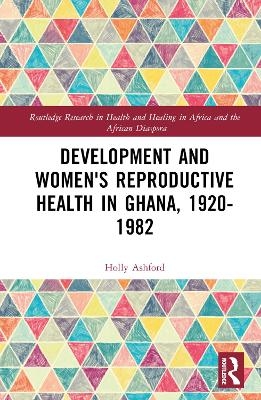
Development and Women's Reproductive Health in Ghana, 1920-1982
Seiten
2022
Routledge (Verlag)
978-1-032-22784-9 (ISBN)
Routledge (Verlag)
978-1-032-22784-9 (ISBN)
This book explores the history of women's reproductive health in Ghana, arguing that between the 1920s and 1980s, it was largely driven by discourses of development and population control. The book will be of interest to researchers and students in the history of public health, development and Africa.
This book investigates the history of women’s reproductive health in Ghana,
arguing that between the 1920s and 1980s, it was largely driven by discourses of
development and population control rather than a concern for women’s health or
rights.
Between the 1920s and 1980s, the choices that Ghanaian women made
regarding their reproductive health were defined by development policy and
practice. Spanning the colonial and immediate postcolonial periods, this book
demonstrates that whilst the substance of development discourse shifted over
time, principles of development continued to be used to impact and legitimise
reproductive health policy and practices well after independence. The book
explores Ghana’s pluralist health system, the introduction of maternal and child
welfare, the dominance of the Red Cross in Ghana’s maternal and child health
landscape, nationalist pronatalism and global population activism. In order to
understand how global iterations of development and health policy impacted
ordinary lives in Ghana, the author uses evidence from multiple ‘levels,’ including
private papers, national archives and records of international and transnational
organisations. Providing balanced archival perspectives, the book includes
extensive oral history interviews carried out with both rural Ghanaian women and
traditional birth attendants, as well as with midwives, doctors and family planning
fieldworkers.
This book will have an important impact on a number of historical fields
including Ghanaian history, global health history, global histories of population
and family planning and histories of development. It will be of interest to
researchers and students in the history of public health, development, Africa,
Ghana and gender.
This book investigates the history of women’s reproductive health in Ghana,
arguing that between the 1920s and 1980s, it was largely driven by discourses of
development and population control rather than a concern for women’s health or
rights.
Between the 1920s and 1980s, the choices that Ghanaian women made
regarding their reproductive health were defined by development policy and
practice. Spanning the colonial and immediate postcolonial periods, this book
demonstrates that whilst the substance of development discourse shifted over
time, principles of development continued to be used to impact and legitimise
reproductive health policy and practices well after independence. The book
explores Ghana’s pluralist health system, the introduction of maternal and child
welfare, the dominance of the Red Cross in Ghana’s maternal and child health
landscape, nationalist pronatalism and global population activism. In order to
understand how global iterations of development and health policy impacted
ordinary lives in Ghana, the author uses evidence from multiple ‘levels,’ including
private papers, national archives and records of international and transnational
organisations. Providing balanced archival perspectives, the book includes
extensive oral history interviews carried out with both rural Ghanaian women and
traditional birth attendants, as well as with midwives, doctors and family planning
fieldworkers.
This book will have an important impact on a number of historical fields
including Ghanaian history, global health history, global histories of population
and family planning and histories of development. It will be of interest to
researchers and students in the history of public health, development, Africa,
Ghana and gender.
Holly Ashford completed her PhD in History at Cambridge University, UK.
Introduction Chapter 1: Hoping for Growth: population and development in colonial Gold Coast 1920 - 1932 Chapter 2: Humanitarianism in the Gold Coast 1932-1939: the establishment of maternal and infant welfare Chapter 3: Social Development and Medicalising Reproduction 1940-1956 Chapter 4: Reproducing the Nation in Nkrumah’s Ghana 1952 – 1966 Chapter 5: Establishing the National Family Planning Programme, 1966 - 1972 Chapter 6: From Population Control to Primary Health Care? Rural Health Interventions in Ghana, 1969 – 1982 Afterword Bibliography
| Erscheinungsdatum | 21.11.2022 |
|---|---|
| Reihe/Serie | Routledge Research in Health and Healing in Africa and the African Diaspora |
| Zusatzinfo | 6 Tables, black and white; 2 Line drawings, black and white; 13 Halftones, black and white; 15 Illustrations, black and white |
| Verlagsort | London |
| Sprache | englisch |
| Maße | 156 x 234 mm |
| Gewicht | 650 g |
| Themenwelt | Studium ► Querschnittsbereiche ► Prävention / Gesundheitsförderung |
| Naturwissenschaften ► Geowissenschaften ► Geografie / Kartografie | |
| Sozialwissenschaften ► Soziologie ► Spezielle Soziologien | |
| Wirtschaft ► Volkswirtschaftslehre | |
| ISBN-10 | 1-032-22784-2 / 1032227842 |
| ISBN-13 | 978-1-032-22784-9 / 9781032227849 |
| Zustand | Neuware |
| Informationen gemäß Produktsicherheitsverordnung (GPSR) | |
| Haben Sie eine Frage zum Produkt? |
Mehr entdecken
aus dem Bereich
aus dem Bereich
das Manual zur psychologischen Gesundheitsförderung
Buch | Hardcover (2023)
Springer Berlin (Verlag)
CHF 55,95
Wissenschaftlich basierte Empfehlungen, Tipps und Ernährungspläne für …
Buch (2022)
Thieme (Verlag)
CHF 69,95


